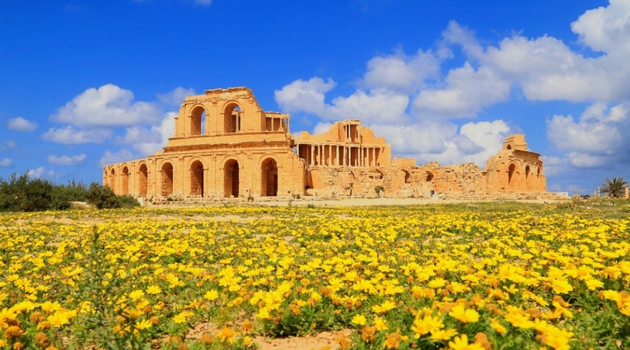By Gerardo Noto, UNDP Libya.
Innovative solutions to stop biodiversity threats in Libya
Every 5th of June since 1974 the world celebrates the International Environment Day. The United Nations family seizes the occasion to raise awareness of pollution, climate change, and sustainable consumption.
This year, the celebration is marked by the infectious disease caused by the most recently discovered coronavirus.
Within the past four decades, research has been increasingly drawn toward understanding the link between the human-nature relationship and its impact on people's health.
Today, I can't help but to think about the words that the UN General Assembly President Tijjani Muhammad-Bande pronounced on 22 April, Earth Mother's Day: "Our experience with COVID-19 demonstrates that we, humanity, are not separate from the world around us", he said. "In this Decade of Action and Delivery to implement the Sustainable Development Goals (SDGs)...we must work together to protect our planet and ecosystems, which affect every aspect of human life".
We are not just linked to nature, we came from nature and as part of it whatever we do in its environment won't only affect animals or plants, but us directly or indirectly.
Humans' behavior influences every single aspect of the environment. Just spoiling with one of these elements and seeing how the health and food systems collapse. We, as humans, have been messing up with not only one but too many elements of nature for too long: water, soil, and air pollution, deforestation; natural resources exploitation...
One of the clear consequences of our behavior is that 1 million species are facing extinction.
This year the theme of World Environment Day 2020 is "Celebrate Biodiversity" just when the COVID-19 pandemic is shocking the world with the consequences we face when biodiversity is compromised. Hence, demonstrating the interdependence of humans and the webs of life, in which we exist.
From my experience in conflict-affected areas, I learned that disasters create opportunities. I see the worldwide crisis that this pandemic is causing as an opportunity to build back better and to stop mistreating the nature that gives us the foods we eat, the air we breathe, the water we drink, and the climate that makes our planet habitable.
In the midst of the pandemic, digital technologies have captured our attention for their potential to help us in the fight against COVID-19. In UNDP, we think in the long-term, looking at innovative ways to support Libya to better prevent and manage such crises and ensure that the country makes full use of the lessons learned from it.
Through our Accelerator Lab, we are collaborating with the private sector and investing in innovation and digital development to enhance digital solutions to tackle the challenges of waste management in Libya, which affect biodiversity and nature.
According to a study conducted by the Head of Technical Centre for Environmental Protection, Dr. Bashir Faris, in 2002, there were around 131,651.20 tons of plastic waste in Greater Tripoli per year. The Accelerator Lab has been able to confirm that the plastic waste present in Libya has increased due to the daily use of plastics packages and plastic water bottles, and the absence of any charge or tax for the use of these plastics. This is added to the open burning of waste in residential areas that have been a problem in the whole country for too long.
Together with its key partners, the Lab is exploring four innovative solutions to tackle the waste management challenges in Libya:
1. Gather information: tapping into collective intelligence methodologies and engaging with actors from the private sector, the community, civil society, and government agencies, the Accelerator Lab is working to offer Janzour municipality several solutions in order to efficiently manage waste collection such as a digital dashboard to visualize the waste and environment situation in the municipality. A data collection tool that local activists would feed through their mobile phones with information about waste locations, types, and volume.
2. Change Behavior: the lab conducted behavioral Insights experiences in the biggest supermarkets in Tripoli to explore how to reduce the single-use plastic bags consumption. Another experiment took place in primary schools in Tripoli by placing recycling waste bin boxes to educate kids on garbage segregation from the source.
3. Use of Technology: The Accelerator Lab in Libya conducted an innovation challenge to create digital solutions to manage waste collection tasks at one of the municipalities in Tripoli. The team asked people to use an App for reporting street waste dumping sites and open burning of trashes that occurred across the city. With this initiative, the Lab is testing technology to help municipalities to better plan and utilize their resources more efficiently, involving citizens as part of the solution. If the project works for one municipality, it could eventually scale up across the country.
The painter Rembrandt said," Choose only one master: nature."
In this era of technology, I would also add "Choose a tool: digital innovation."
(Source: UNDP)





